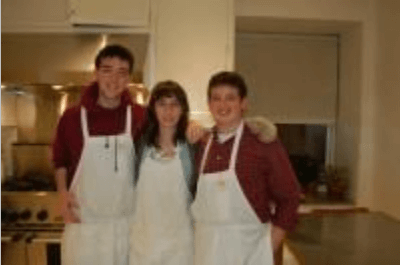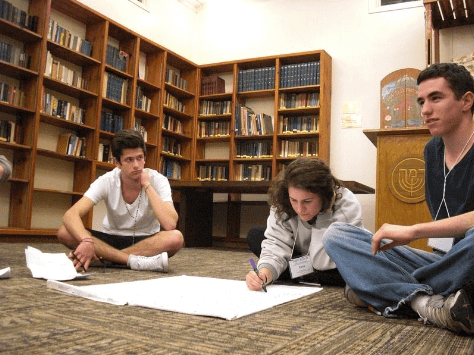Original Article On the Jerusalem Post
Sitting at the Nalaga’at (“Please Touch”) Center in Jaffa, Howard Blas, special educator and social worker from New York, sits down to speak with The Jerusalem Post about a fascinating group of young men and women who have come to Israel for a 10-day trip. The travelers, all affiliated with the Conservative movement’s Camp Ramah, are developmentally disabled and their experiences, their counselors tell the Post, have allowed them to see this country through fresh eyes.
As several deaf waiters weave among tables ” the center is a major employer of the handicapped and an inspiration to the campers whom they are serving ” Blas explains how the trip has helped bond his charges to both nation and religion.
The campers all belong to the Tikvah program, a track at the Ramah summer camps for those with special needs. All eight of the campers on this specific trip fall into the higher-functioning spectrum and some are even taking classes at community colleges back in the US.
The group that’s here on the Israel trip are some of the older members of our group, Blas tells the Post. The youngest is turning 19 today and I guess that the oldest is probably 25 or 26.
The idea of an Israel trip, Blas continues, was the brainchild of Herb and Barbara Greenberg, now residents of Israel, who believed that this population, who had been learning about Israel at camp… had the same love for Israel and the same right to travel to our homeland as any Jew.
Since the first trip in 1984, Camp Ramah has brought Tikvah participants to Israel numerous times. A number of the campers on this trip have been here before.
We stress Israel [and] Zionism at camp and this is their chance to really [experience that] Blas says.
The trip, which brings the campers, who normally prefer stability and routine, to different destinations every day, really focuses on their independence, he explains.
Some of the higher-functioning campers will have been together so many years in camp, some have been in camp for 10 years, so some know how to help each other… and compensate for each other’s shortcomings.
According to Blas, in a new country there are a lot of new systems to learn, so even something as simple as the shower, the shower works differently. We go to three different hotels. It’s a different experience in each place so we even have to go ahead and figure that out quickly and then explain it to them… It’s a very frenetic pace.
This is my fourth or fifth trip that I’ve done he says, and the founders did eight or nine trips when they were the directors and with each trip you really fine-tune what you do so you pick hotels that don’t have a lot of extra room for wandering around [for example].
By bringing the campers to Israel without their parents, he continues, they’re learning life skills. Small things like packing in a hotel, it’s all part of life skills. That’s really what the goal is: to prepare them for living as independently as they can.
We give them a lot of running commentary and try to connect what they are seeing with things that they have learned in camp, but they’ve been fantastic, the director enthuses about his campers.
THE TIKVAH program itself was founded at Camp Ramah in 1970 by the Greenbergs, who now live in Raanana. In its first year, the program enrolled eight campers classified by their respective school systems as brain-injured, learning disabled and emotionally disturbed, says Blas. Over the years, it has enrolled children and adolescents with Down syndrome, autism, neurological impairments, developmental delays and rare disorders such as Smith-Magenis and Prader-Willi syndrome.
As the director of one of the first such programs in the Jewish world, Blas is noticeably pleased with his work, telling the Post that Tikvah is a trailblazer.
Are very proud of the fact that we are probably the first program [of its type], he says. One of the few places where there is real collaboration in Judaism is around special needs.

Howard Blas’s son, Daniel, a 19-year-old freshman at the University of Pennsylvania, is one of the counselors on this year’s trip, his second time coming to Israel with Tikvah.
Daniel believes that by being forced to explain things to his campers in a simplified manner, he has to reevaluate everything he knows, thus gaining a deeper understanding of Israel and [his] beliefs in general.
Asked to give a specific example, Daniel says that when explaining to his campers why there are soldiers everywhere, he must confront head-on the fact that Israel is a “country in conflict.†This helps him recognize why the soldiers are there in the first place [and] the fact that at this point, after many Israel trips, I’ve just taken [many things] for granted in general.
Avriel Feiner, known as Avi, also serves on the staff of the Tikvah program. A 22-year-old senior at the University of Maryland, Feiner is studying special education, in large part because of her involvement with the special campers of Camp Ramah.
This is my first time ever going [to Israel] with this population it’s really interesting and inspiring to see Israel through their eyes, she says, concurring with Daniel.
I was complaining today No, not the Palmah Museum again, she says. We walked out and they were like ‘my gosh, this was so cool, we love this. History is so awesome, that was so intense.
Many experiences, such as visiting the Western Wall, Feiner says, have lost their excitement to someone who has been there numerous times. However, going with the Tikvah participants this time, she says that “the guys were dancing like crazy [on the men’s side] for an hour and a half. That’s amazing. Where else are they going to have that?
Moreover, Daniel interjects, the campers have had an influence on everyone who we’ve seen, not just on me and Avi as the leaders.
Daniel recounts that on one occasion, one of the campers entered the dining room of their hotel to say goodbye to the participants of an unrelated Birthright trip, many of whom called out goodbye to him by name, despite the two groups not having had any official contact.
He’s just been so friendly to everyone and everyone’s been amazed, Daniel says, smiling.
THE CAMPERS who spoke with the Post seem to back up their counselors assertions, smiling and regaling this reporter with stories of their experiences. Many, Howard Blas asserts, have minimal contact with Jewish life outside of camp, making this experience even more important to them on a personal and spiritual level.
Sarah, a sweet girl the same age as Feiner, attends a boarding school in Connecticut where she is studying the life skills necessary so that she can be mainstreamed into as normal a life as possible. These skills will be especially important as she plans to move into her own apartment for the first time next year.
The trip, she says, is very nice and not “boring like Birthright. Now I learn more, she says.
Her favorite part of the trip, she says, is “making candles. This is a typical type of project for the campers, providing a physical stimulus and engaging them in a hands-on activity. The campers have also picked vegetables for charity and engaged in an archeological dig at the Beit Guvrin national park.
Such outings have even more meaning for Sarah than for most of the campers, as her time at camp accounts for all her Jewish experiences for the entire year, which makes this trip something of a bittersweet experience.
The skills she had learned in the Tikvah program, Blas says, will serve her well in life. Ramah special-needs campers perform jobs at camp, enabling them to learn skills that many people take for granted.
With guidance here and there, some of the campers on this trip, Feiner believes, could function independently soon.
Chiming in, Daniel Blas adds that “In general, we try to focus on abilities rather than disabilities.
Jason, a 27-year-old participant who is studying journalism, among other subjects, at a community college, is a good example of this mind-set.
Coming to Israel, Jason says, means connecting with “different areas of Israeli history and culture [and] to better understand what’s going on inside the country. This, he explains, makes it more easier to understand what may happen later and possibly in the future.
The experience for the special campers of the Tikvah Program is best summed up by their visit to Mount Herzl, the burial place of Theodor Herzl.
We also went to Har [Mount] Herzl, someone who believed in a State of Israel because he saw that the Jews couldn’t live in Germany because the French accused them of treason, says Avi, another Tikvah participant.
The visit, explains Daniel, allowed trip participants to discuss their dreams and aspirations in a comfortable way while connecting to their heritage as Jews and Zionists.
Sitting in the military cemetery, we were trying to find a way to have them connect to all these graves, Daniel says, and we decided to speak about dreams and setting goals for ourselves because a lot of what we do [in camp] is about setting goals.
Sarah and Avi said that one of their goals is to become more independent but really to live in an apartment, so their goal for the future is to move out of a group home and out of the boarding school [and to gain independence] and that’s a way we helped them to connect [to Herzl and Zionism].
Sitting and speaking with the Post on their final evening in Israel, the campers and their caretakers seem happy yet exhausted. After returning home from Israel, Howard Blas says, he will need a vacation from this vacation.






